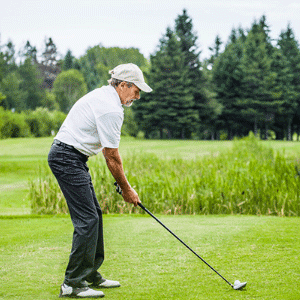 Golf is a sport that people of all age groups and skill levels can play, and as with any sport, injuries are a part of the game. The complex and dynamic nature of the golf swing accounts for most injuries linked to golf. Recreational golfers get injured mostly due to improper technique, while professional golfers are often plagued with overuse injuries.
Golf is a sport that people of all age groups and skill levels can play, and as with any sport, injuries are a part of the game. The complex and dynamic nature of the golf swing accounts for most injuries linked to golf. Recreational golfers get injured mostly due to improper technique, while professional golfers are often plagued with overuse injuries.
Here are 7 common injuries linked to golf and how they can be avoided:
- Rotator Cuff Injury: Repeatedly taking the shoulder through extreme ranges of motion results in tears in the rotator cuff. Stretching and strengthening exercises that improve external rotation of the shoulder will help protect your rotator cuff from injury.
- Lateral Epicondylitis: The extensor tendons on the outside of the leading forearm are strained by the jarring impact of striking the ball resulting in inflammation and pain.
- Golfer’s Elbow: The flexor tendons on inside of your trailing forearm are affected by the same mechanism of injury as lateral epicondylitis. Both injuries can be avoided by keeping the arms straight but relaxed and not locked during the entire golf swing.
- Lumbar Spine Injury: The torque created when rotating the pelvis and lumbar spine separately (which is done to generate more power) can injure the tendons, ligaments, and muscles in the lumbar spine. To protect your lower back, try to ensure both hips and shoulders rotate at the same time while striking the ball.
- Shoulder Labral Tear: Pulling the lead arm forcefully against the chest during the back swing can cause tears on the posterior labrum resulting in shoulder instability. The key to avoiding this injury is to swing less and turn more. Think of it as swinging your arms with your torso and not your shoulder muscles.
- Knee Meniscus Injury: Squaring the lead foot and locking the knee in an internally rotated position as you shift your weight when following through after striking the ball increases shearing forces on the knee which can damage the meniscus. Rotating your foot 20-30 degrees outward will reduce the intensity of the forces acting on the knee.
- Hip Cartilage Injury: Although less common than other types of golf injury, hip cartilage tears do occur and can serious impair your game. If a hip cartilage tear is diagnosed as the cause of your hip pain, prompt arthroscopic repair may be able to restore function and help you return of the golf course with minimal delay.
At North Central Surgical Center, our mission is to treat each and every one of our patients, and their families, as if they were our own family member. Each patient, each family, each and every time.





